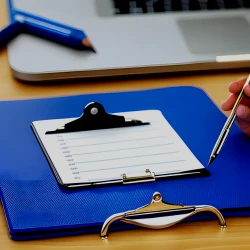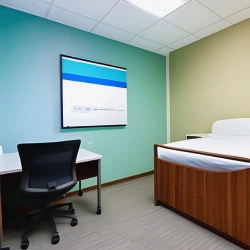You may be entitled to recover compensation and our legal team can help. Please click the button below for a Free Consultation or call us toll-free 24 hrs/day for legal advice by dialing (866) 588-0600.
Several hernia mesh patients have experienced bowel obstruction after surgical mesh implants, possibly due to special coatings applied to the mesh.
The coatings applied to specific devices wear off over time, causing common hernia mesh complications. As a result, the mesh may become entangled in the intestines, causing bowel obstructions.
Patients who have experienced failed hernia mesh surgery, bowel obstructions, and other hernia mesh post-operative complications have already begun filing claims in the hernia mesh lawsuit against the negligent manufacturers.
At Schmidt & Clark, LLP, we are experts in hernia mesh lawsuits. The whole team is committed to holding people responsible for their negligence and helping those affected by defective hernia mesh get the needed assistance.
Why Choose Schmidt & Clark, LLP For Your Claim
We have over 20 years of experience representing injured people in their claims against large corporations and government agencies.
Our lawyers represent the victims of defective hernia mesh in the United States.
Our law firm will deal with every aspect of your case on your behalf and guide you through every stage of litigation.
Table Of Contents
- Quick Summary
- What Are Bowel Obstruction and Bowel Blockage?
- How Does Hernia Repair Surgery Lead To Bowel Obstruction?
- What Are the Signs of Bowel Obstruction Caused by Hernia Repair?
- What Are the Complications Caused by Bowel Obstruction?
- How Is Bowel Obstruction Diagnosed, and What Is the Prognosis?
- How Is Bowel Obstruction Treated?
- Why Should You Contact a Personal Injury Lawyer for Bowel Obstruction?
- FAQs
- Get a Free Lawsuit Evaluation With Our Lawyers
Quick Summary
- Bowel obstructions after a hernia repair surgery can result in certain complications that may require another surgical procedure.
- Dead tissues and infections are typically the consequences of bowel blockages which are best addressed immediately.
- You always have the right to file a lawsuit for bowel obstruction after a hernia repair surgery with evidence of a medical report.
What Are Bowel Obstruction and Bowel Blockage?

When facing these life-threatening complications, you can’t have a bowel movement or pass gas if your digestive system stops working. You may also experience stomach pain and a swollen abdomen.
Fecal impaction is a common type of blockage. It is also safe to say that a bowel obstruction exists if your bowel is blocked by something other than hard stool.
The bowel can either be blocked partially or entirely. There’s also pseudo-obstruction – a type of obstruction that happens when you have bowel obstruction symptoms, but nothing physically is blocking it.
It can occur due to issues with your gastrointestinal muscles or the nerves that control them.
The symptoms of an intestinal blockage vary depending on the severity of the obstruction. However, it almost always comes with abdominal pain, usually around the belly button, and cramping.
Because many people with bowel obstructions are elderly and may have other serious illnesses, a bowel obstruction can be fatal.
Related Article: Hernia Mesh Patch Lawsuit Update
How Does Hernia Repair Surgery Lead To Bowel Obstruction?
Hernia repair surgery can lead to bowel obstruction and other complications due to adhesions to the abdomen or entrapment under the mesh based on the applied mesh technique.
Other ways in which hernia surgery can lead to bowel obstruction are if the surgeon accidentally damages the intestine during the procedure or if scar tissue forms around the repaired hernia and restricts the movement of the intestine.
It is also possible for a hernia to recur after surgery, which can lead to bowel obstruction if the hernia becomes large enough to block the intestine.
The risk of bowel obstruction after hernia repair surgery is relatively low; however, the hernia mesh complication should be discussed with a surgeon before the procedure.
What Are the Signs of Bowel Obstruction Caused by Hernia Repair?
Some of the symptoms of bowel obstruction caused by hernia repair include:
- Abdominal cramping that comes and goes
- Appetite loss
- Constipation
- Vomiting
- Inability to pass gas or have a bowel movement
- Abdominal enlargement.
The intestines can suffer from various symptoms and disorders, including severe hernias and bowel obstructions.
These co-occurring disorders cause great pain and can be fatal if left untreated. Fortunately, various treatment options are available to assist an individual in overcoming these issues. It is also essential that one seeks medical care when a number of the signs begin to occur.
What Are the Complications Caused by Bowel Obstruction?
Some serious complications caused by bowel obstruction include pain, nausea, vomiting, constipation, dehydration, malnutrition, infection, and perforation.
- Pain: Bowel obstruction can cause abdominal pain, ranging from mild to severe pain, depending on the severity of the obstruction.
- Nausea and vomiting: When the intestine is blocked, the contents of the intestine cannot pass through and may be vomited out.
- Constipation: If the intestine is blocked, the contents of the intestine cannot pass through, which can lead to constipation.
- Dehydration: Vomiting and diarrhea can cause loss of fluids from the body, leading to dehydration.
- Malnutrition: If the intestine is blocked, it may not be able to absorb nutrients from food, leading to malnutrition.
- Infection: If the intestine is blocked, bacteria may build up and cause an infection.
- Perforation: If the intestine is blocked for a long time, the pressure may cause the intestine to rupture, leading to a potentially life-threatening infection.
It’s important to seek medical attention if you experience any of the above symptoms, as bowel obstruction can be a serious condition that requires prompt treatment.
How Is Bowel Obstruction Diagnosed, and What Is the Prognosis?

Your doctor will inquire about your medical history as well as your symptoms. They will also perform a physical examination to evaluate your situation.
If your abdomen is swollen or tender or has a lump, your doctor may suspect an intestinal obstruction.
They may use a stethoscope to listen to bowel sounds.
Some other diagnoses may include:
- Ultrasound. When a child has an intestinal obstruction, ultrasound is frequently the preferred type of imaging. An ultrasound will typically show a “bull’s-eye” representing the intestine coiled within the intestine in children with intussusception.
- X-ray. Your doctor may recommend an abdominal X-ray to confirm a diagnosis of intestinal obstruction. Some intestinal obstructions, however, are not visible with standard X-rays.
- Air or barium enema. An air or barium enema allows for better colon imaging. This may be done for specific suspected obstruction causes. The doctor will insert air or liquid barium into the colon via the rectum during the procedure. In most cases, an air or barium enema can cure intussusception in children, and no further treatment is required.
- Computerized Tomography (CT). A CT scan produces cross-sectional images by combining various X-ray images taken from multiple angles. These images are more detailed than a standard X-ray and are more likely to reveal an obstruction in the intestine.
Viable prognoses that may follow up after your doctor determines the diagnosis of your bowel blockage usually rely on the cause of your condition and the required hospitalization.
When you arrive at the hospital, the doctors will stabilize you so you can be treated.
This procedure could include:
- Inserting an intravenous (IV) line into a vein in your arm to allow fluids to be administered
- Put a tube through your nose and your stomach to suck out air and fluid and relieve abdominal swelling (nasogastric tube).
- Inserting a thin, flexible tube (catheter) into your bladder to drain and collect urine for testing purposes.
How Is Bowel Obstruction Treated?
Partial Obstruction Treatment
If you have an obstruction through which some food and fluid can still pass (partial obstruction), you may not require further treatment once stabilized. Your doctor may advise you to follow a low-fiber diet that is easier for your partially blocked intestine to digest. If the obstruction is unclear, surgery may be required to remove it.
Complete Obstruction Treatment

The obstruction and any sections of your intestine that have died or been damaged are typically removed during surgery.
Alternatively, your doctor may recommend using a self-expanding metal stent to treat the obstruction. An endoscope is passed through your mouth or colon to insert the wire mesh tube into your intestine. It forces the intestine open so that the block can be removed.
Stents are typically used to treat colon cancer or to provide temporary relief in patients for whom emergency surgery would be too risky. Once your condition has stabilized, you may still require surgery.
Pseudo-Obstruction Treatment
If your doctor determines that your signs and symptoms are due to pseudo-obstruction (paralytic ileus), they may keep you in the hospital for a day or two and treat the cause if it is known.
Paralytic ileus can improve on its own. In the meantime, you’ll most likely be fed via nasogastric tube or IV to prevent malnutrition.
In case your paralytic ileus does not improve, your doctor may prescribe medication that causes muscle contractions, aiding the passage of food and fluids through your intestines.
If a medical condition or medication causes the paralytic ileus, the doctor will treat the underlying disease or discontinue the medication. Surgery is only used in rare cases.
In cases where the colon is enlarged, a procedure known as decompression may be used to provide relief.
Colonoscopy, a process in which a thin tube is inserted into your anus and guided into the colon, can be used to decompress. Decompression surgery is also a viable option.
Why Should You Contact a Personal Injury Lawyer for Bowel Obstruction?

A medical malpractice lawsuit may be filed if a bowel obstruction is not diagnosed or treated. A significant delay in transporting a patient to surgery also serves as the foundation for a case.
Delays in diagnosis and treatment can lead to sepsis, bowel ischemia, and even death.
To file a malpractice lawsuit, you must demonstrate that a medical error resulted in serious injury post-hernia repair surgery.
Related Articles:
See all related medical device lawsuits our attorneys have taken on.
FAQs
What Is the Compensation Gotten After Filing a Lawsuit for Bowel Obstruction?
The compensation you receive after filing a lawsuit for bowel obstruction will depend on the severity of your injuries, the extent to which they have impacted your life, and other factors. Consult with an attorney to get a better idea of the potential damages you may be able to recover in your specific case.
When Should One Suspect a Bowel Blockage?
You could suspect a bowel blockage if your abdomen is swollen or tender or if there is a lump in your abdomen.
How Long Does It Take To Recover From a Bowel Obstruction?
Your recovery time will be determined by your age, whether you had keyhole or open surgery, and your overall health. You will most likely be hospitalized for 4-7 days, but full recovery can take up to 2-3 months.
How Does Mesh Cause Bowel Obstruction?
Mesh can cause bowel obstruction by the mesh’s pressure on the colon, small intestines, and stomach. It is most frequent in patients who have developed scar tissue from umbilical hernias.
Are There Legal Options if I Suffer a Bowel Obstruction Due to Hernia Mesh?
Yes, if you suffer a bowel obstruction due to hernia mesh, there are legal options to pursue compensation. You can file a lawsuit against the manufacturer or distributor of the mesh, particularly if there was negligence in design, manufacturing, or labeling that contributed to your condition.
Get a Free Lawsuit Evaluation With Our Lawyers
Schmidt & Clark, LLP is currently accepting cases for those who have been injured by hernia mesh.
If you believe you have been injured by hernia mesh, don’t hesitate to contact us today to schedule a free consultation with one of our experienced lawyers.
Our expert team will help you file a case and get the justice you deserve.
References:
- https://www.drugwatch.com/hernia-mesh/complications/
- https://www.ncbi.nlm.nih.gov/pmc/articles/PMC3015500/
- https://www.hopkinsmedicine.org/health/conditions-and-diseases/understanding-an-intestinal-obstruction
- https://thesurgicalclinics.com/the-connection-between-hernias-and-bowel-obstructions/
- https://www.mayoclinic.org/diseases-conditions/intestinal-obstruction/symptoms-causes/syc-20351460

 Published by
Published by 

